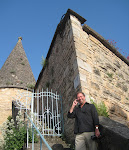 Written by George Bernard Shaw written in 1913,the play is based on the Greek myth of Pygmalion. Many people know it better as the story of My Fair Lady. The play tells the story of Henry Higgins, a professor of phonetics (based on phonetician Henry Sweet), who makes a bet with his friend Colonel Pickering that he can successfully pass off a Cockney flower girl, Eliza Doolittle, as a refined society lady by teaching her how to speak with an upper class accent and training her in etiquette.
Written by George Bernard Shaw written in 1913,the play is based on the Greek myth of Pygmalion. Many people know it better as the story of My Fair Lady. The play tells the story of Henry Higgins, a professor of phonetics (based on phonetician Henry Sweet), who makes a bet with his friend Colonel Pickering that he can successfully pass off a Cockney flower girl, Eliza Doolittle, as a refined society lady by teaching her how to speak with an upper class accent and training her in etiquette. As a side note, at the beginning of the movie, Professor Higgins when he first meets her in Convent Garden tells Eliza that she is from Lisson Grove. I always enjoy telling people that I live in the same neighborhood! I am always puzzled by the fact that Eliza is referred to as a cockney when Lisson Grove is no where near Bow Bells!
As a side note, at the beginning of the movie, Professor Higgins when he first meets her in Convent Garden tells Eliza that she is from Lisson Grove. I always enjoy telling people that I live in the same neighborhood! I am always puzzled by the fact that Eliza is referred to as a cockney when Lisson Grove is no where near Bow Bells!Cockney often refers to working class Londoners, particularly those in the East End and the language they speak. According to traditional definition, a "true" Cockney is someone born within earshot of the Bow Bells, i.e. the bells of St. Mary-le-Bow church in Cheapside in the City of London (which is not itself in the East End). Formerly it included Clerkenwell, Finsbury, Shoreditch, Hoxton, Stepney, Bethnal Green, Limehouse, Mile End, Wapping, Whitechapel, Shadwell, Bermondsey, Rotherhithe, Surrey Quays and The Borough.
 The first English production in opened at His Majesty's Theatre, London on April 11, 1914 and starred Mrs. Patrick Campbell as Eliza and Sir Herbert Beerbohm Tree as Henry Higgins; it was directed by Shaw himself. I am looking forward to this production as today is the birthday of both Shaw and Kevin Spacey (the artistic director of the Old Vic).
The first English production in opened at His Majesty's Theatre, London on April 11, 1914 and starred Mrs. Patrick Campbell as Eliza and Sir Herbert Beerbohm Tree as Henry Higgins; it was directed by Shaw himself. I am looking forward to this production as today is the birthday of both Shaw and Kevin Spacey (the artistic director of the Old Vic). GB Shaw was interesting man. A prolific writer, founding member of the Fabian society and London School of Economics he abhorred formal education and held an animosity toward schools and teachers, saying, "Schools and schoolmasters, as we have them today, are not popular as places of education and teachers, but rather prisons and turnkeys in which children are kept to prevent them disturbing and chaperoning their parents.”. I wonder what my kids would make of that quote?
GB Shaw was interesting man. A prolific writer, founding member of the Fabian society and London School of Economics he abhorred formal education and held an animosity toward schools and teachers, saying, "Schools and schoolmasters, as we have them today, are not popular as places of education and teachers, but rather prisons and turnkeys in which children are kept to prevent them disturbing and chaperoning their parents.”. I wonder what my kids would make of that quote? 










No comments:
Post a Comment